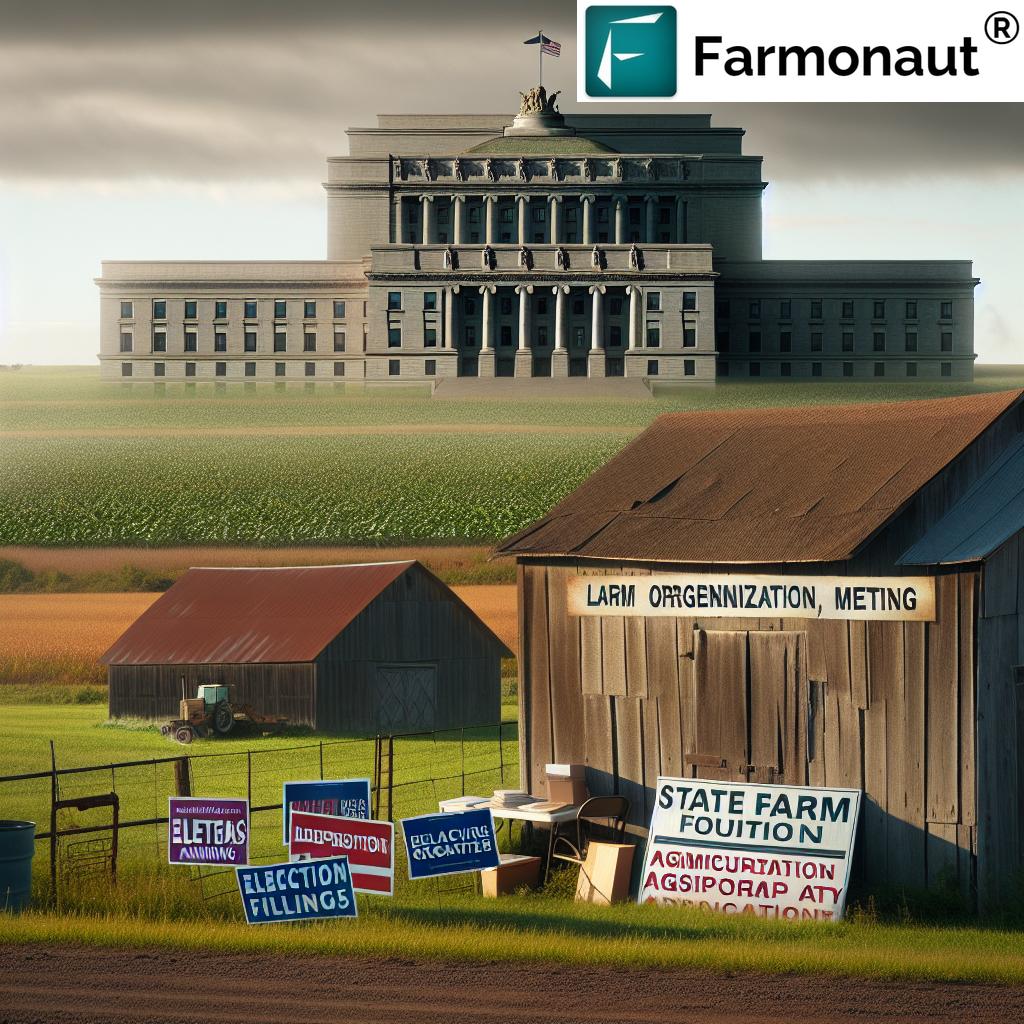5 Key Ways Supreme Court Deportation Case Affects Minnesota Agriculture
“Over 20% of Minnesota’s farm workforce are immigrants, making Supreme Court deportation rulings crucial for state agriculture.”
Table of Contents
- Introduction: Supreme Court Deportation and Minnesota Agriculture
- Supreme Court Deportation Case & Changing Immigration Policy Administration
- 1. Labor Availability Crisis in Minnesota Agriculture
- 2. Economic Output, Farm Operations & Financial Ripple Effects
- 3. Effects on Political Action Committees & Federal Election Filings
- 4. Direct Impact on Congressional & State Election Races
- 5. Health Care, Human Rights & Minnesota’s Immigrant Communities
- How Farmonaut Supports Minnesota’s Agriculture Industry
- Comparative Impact Table: Deportation Rulings & Minnesota Agriculture
- Frequently Asked Questions (FAQs)
- Conclusion: Navigating Uncertainty with Data, Advocacy & Innovation
Introduction: Supreme Court Deportation and Minnesota Agriculture
Immigration and agriculture in Minnesota are deeply intertwined, with more than one in five farm workers coming from immigrant backgrounds. Recent developments—particularly the Supreme Court deportation case involving Kilmar Abrego Garcia—have sent ripples across the state’s agricultural, political, and economic landscape. The Supreme Court ruling on removal has reignited debates about immigration policy administration, farm workforce stability, and support provided by major political action committees and congressional leaders.
With federal election filings showing large campaign contributions from agricultural interests, and Agriculture Committee support shaping debate among candidates like Rep. Angie Craig, it is essential for all of us to understand how court decisions, elected officials, and state farm organizations come together to influence everyday farm operations and the broader direction of both state and congressional election races.
Supreme Court Deportation Case & Changing Immigration Policy Administration
To fully grasp the implications of the Supreme Court deportation case for Minnesota agriculture, we first need to understand the legal and political context. In a rare 9-0 decision, the United States Supreme Court sided against a Trump administration move to deport Kilmar Abrego Garcia—a Salvadoran immigrant living in Maryland who had previously been granted legal permission to remain in the states.
Despite a court order forbidding Abrego Garcia’s removal to El Salvador, and a clear admission by the U.S. government that this removal was unlawful, the Trump administration continued to insist that nothing could be done to bring him back—a position echoed by El Salvador’s President Nayib Bukele.
This Supreme Court ruling on removal sets an important precedent, fueling vigorous debate among Democratic and Republican leaders, agriculture committee chairs, political action committees, and advocacy groups. In Minnesota, these developments are not merely abstract legal contests; they have immediate, tangible impacts on our farm workforce, economic output, state election races, and agricultural policy.
“Minnesota agriculture contributes $112 billion annually, with immigration policy shifts potentially impacting thousands of farm operations.”
1. Labor Availability Crisis in Minnesota Agriculture
The Human Side of a Supreme Court Ruling on Removal
Let’s start with the most immediate and visible impact: labor availability. The state farm sector relies heavily on immigrants—documented and undocumented—many of whom are now living in a climate of uncertainty due to shifting immigration policy administration and headline-capturing Supreme Court deportation cases like Abrego Garcia’s.
- Over 20% of Minnesota farm workers are immigrants.
- These workers harvest, plant, care for livestock, and perform critical tasks in both red and blue rural areas.
- With heightened fears of deportation, some laborers are leaving agriculture altogether or relocating to states perceived as safer.
Farm operations—from dairy in Stearns county to vegetable growers in Mankato and grain producers in Willmar—are seeing increased labor shortages. The direct correlation between high-profile court actions and worker uncertainty cannot be overstated.
Agricultural Committee Support & Political Responses
We have witnessed how Democrat and Republican lawmakers—including Agriculture Committee leaders—use town hall meetings politics to discuss these labor issues directly with their constituents. Rep. Angie Craig, who holds significant agriculture committee support, frequently addresses labor availability in her district, seeking more pragmatic and humane administration of immigration policy.
Without stable, accessible immigrant labor:
- Farmers in Minnesota’s core ag counties face unharvested crops.
- Livestock operations cannot maintain production cycles.
- Reduced workforce destabilizes annual output projections and crop rotation plans.
Farmonaut’s large-scale farm management solutions
provide managers and owners with real-time satellite imagery and AI dashboards to track labor needs and optimize farm operations, especially in times of workforce unpredictability.
2. Economic Output, Farm Operations & Financial Ripple Effects
How Deportation Policy Disrupts the Minnesota Farm Economy
When Supreme Court decisions allow or accelerate the removal of experienced workers, the effects on economic output are profound.
- Minnesota’s agricultural sector contributes over $112 billion annually to our state economy.
- Every lost worker translates to decreased output—fewer planted acres, lowered yields, and ultimately less spending in rural areas.
- Uncertainty created by deportation actions raises operational costs for farmers already dealing with razor-thin margins.
Financial Stress and Farm Bureau, PAC & Committee Responses
State farm organizations and agricultural political action committees are ramping up their support for candidates who will fight for reliable labor streams and transparent, fair immigration enforcement. Recent federal election filings reveal that much of Rep. Craig’s fundraising comes from political action committees representing major farm interests, including the Texas Farm Bureau, South Carolina Farm Bureau, and Ohio Farm Bureau.
Their support signals the centrality of immigration and supreme court removal policies to the everyday business of Minnesota’s family farms and large agribusinesses alike.
By implementing Farmonaut Carbon Footprinting,
farm owners can monitor and optimize resource use, reducing overhead costs even during staffing shortages, and remain compliant with both state and federal environmental regulations.
Additionally, Farmonaut’s fleet management systems empower businesses to efficiently reallocate resources and manage logistics as the workforce fluctuates.
3. Effects on Political Action Committees & Federal Election Filings
The Power of Agricultural Interests in Political Campaigns
Political power in Minnesota agriculture increasingly flows through political action committees, federal election filings, and state farm organizations. As the supreme court deportation case keeps immigration policy at the intersection of farming and politics, we’ve seen several notable trends:
- Fundraising for key candidates (such as Rep. Craig and her rivals) is dominated by contributions from agricultural groups and their PACs.
- These PACs, representing tens of thousands of farm citizens, direct support based on a candidate’s stance on immigration policy administration, agriculture committee support, and rural economic initiatives.
- State farm organizations in Texas, South Carolina, and Ohio have all invested in Minnesota’s congressional races.
This increases the stakes surrounding supreme court removal decisions. Candidates are expected to weigh in on legal deportation processes, humane treatment of immigrants, and economic stability* for farming communities. How a candidate votes or speaks at a town hall meeting politics event can make the difference between election victory or difficult general and primary races ahead.
4. Direct Impact on Congressional & State Election Races
Supreme Court Deportation Case, Voter Sentiment, and Campaign Dynamics
Beyond the farm, the political implications spiral outward. The Supreme Court deportation case has already become a wedge issue in state and congressional election races, influencing campaign strategies and policy proposals. Here’s how:
- Candidates’ Handling of Immigration and Supreme Court Rulings: Rep. Angie Craig, through aggressive fundraising and agriculture committee support, has established herself as a leading voice for Minnesota farmers’ interests. She attends town halls in GOP-held districts to engage red and independent rural voters, directly addressing labor, economic, and immigration policy concerns.
- Primary & General Races: Multiple Democratic and GOP challengers—including Lt. Gov. Peggy Flanagan and Melisa López Franzen—are pushing their stances on the interplay of Supreme Court rulings, immigration policy administration, and farm support. Federal election commission filings show that support from agricultural PACs is pivotal.
With intense focus on town hall meetings politics, campaign messaging increasingly references united states court actions, clear or conflicting administration decisions, and the implications for both farm operations and human rights.
The resonance of these debates is especially strong in rural Minnesota, where voter blocks depend on the stability of the agricultural workforce and access to political representation that values both economic output and constitutional protections.
5. Health Care, Human Rights & Minnesota’s Immigrant Communities
How Deportation Policy Shapes Social Services and Human Capital
The impact of Supreme Court deportation case decisions extends well beyond economics and elections. The very fabric of Minnesota’s rural and urban communities—from Stearns county to Minneapolis—depends on access to health care, stable family life, and the human rights of immigrant citizens.
- Deportations threaten family unity, disrupt children’s education, and increase rural poverty rates.
- Uncertainty over immigration status undermines the willingness of farm workers to seek health care for low-income citizens.
- With proposed Medicaid cuts and block grants on the horizon for “red” areas, the policy debates that flow from court cases like Abrego Garcia’s only grow more urgent.
- Community safety is also impacted, with fears of arbitrary removal undermining trust in local law enforcement and public institutions.
Minnesota’s tradition of advocating for both agricultural productivity and social responsibility is now being tested. As some candidates and PACs campaign on restoring administrative order and supporting farm families, others focus on defending constitutional due process and human rights, especially when it comes to protecting immigrant workers from unjust removal.
Farmonaut’s suite of blockchain-based product traceability solutions helps organizations and government agencies maintain transparency and trust, ensuring reliable data for food safety, labor documentation, and agricultural supply chain integrity.
In this new era, community benefit hinges on the shared efforts of courts, house agriculture committees, independent organizations, and industry leaders to build a system that is just and economically viable.
How Farmonaut Supports Minnesota’s Agriculture Industry
As we navigate these turbulent times, it’s important to note how technology can mitigate the fallout from legal, political, and social upheavals. Farmonaut, as a pioneer in affordable, satellite-based farm management, delivers powerful benefits to Minnesota’s farmers, agri-businesses, and policy organizations:
- Real-Time Crop Health Monitoring: Multispectral satellite images provide up-to-date vegetation health, soil moisture, and other predictive analytics—helping farmers maximize yield even as workforce numbers change.
- AI-Powered Farm Advisory: Jeevn AI gives instant, personalized advice to enhance productivity.
- Traceability & Transparency: Blockchain-based systems allow growers to prove the authenticity of their produce and workforce documentation, thereby navigating compliance requirements in a shifting regulatory climate.
- Fleet & Resource Management: Farmonaut provides robust fleet and machinery tracking tools to reduce costs and improve field safety.
- Carbon Footprint Tracking: For those pursuing or requiring environmental compliance, Farmonaut Carbon Footprinting enables measurement and reductions in emissions.
With subscription models and both web/mobile/API access for maximum flexibility, Farmonaut empowers everyone – from individual growers to major cooperatives and government agencies – to adapt, prosper, and serve both economic and humanitarian needs.
-
API Access: Developers and agri-organizations can enhance their platforms with Farmonaut’s satellite and weather data via Farmonaut API. Seamlessly integrate real-time analytics into your own farm management or policy tracking apps. See full documentation:
API Developer Docs - Crop Loan & Insurance Verification: Validate farm lending and insurance with up-to-date satellite imagery through Farmonaut’s crop loan and insurance verification product.
Comparative Impact Table: Deportation Rulings & Minnesota Agriculture
| Key Area Affected | Estimated Change/Impact | Policy/Committee Response |
|---|---|---|
| Labor Availability | 10–20% estimated reduction in immigrant labor force due to deportation uncertainties | Agriculture Committee support for reform, urgent PAC funding for pro-labor candidates |
| Crop Production | Potentially 7% yield decrease from unharvested fields or delayed planting | State farm organizations push for expanded guest worker programs, bipartisan town hall meetings |
| Economic Output | Annual state GDP impact of $500M–$1B if workforce uncertainty persists | Political action committees lobbying for Congressional legislative fixes |
| Farm Operations | Rising labor costs, increased demand for automation, more reliance on tech solutions | Strong advocacy for investment tax credits and AI-driven resource management |
| Election Outcomes | Shift in rural and independent district voter sentiment; closer races; potential for policy gridlock | Committee hearings, PAC endorsements, increased political ad spending |
Frequently Asked Questions (FAQs)
1. What is the Supreme Court deportation case and why is it important for Minnesota agriculture?
The Supreme Court deportation case involving Kilmar Abrego Garcia is a precedent-setting legal decision where the U.S. Supreme Court ordered the return of a Salvadoran immigrant who was illegally deported despite a court ruling protecting him. Because over 20% of Minnesota’s farm workforce are immigrants, policy shifts resulting from such cases can impact thousands of farm operations, the availability of labor, and the state’s agricultural economy.
2. How does immigration policy administration affect my farm or agribusiness?
Uncertainty in immigration policy administration can create labor shortages, raise costs, force investment in automation, and affect the overall profitability of your operation. Policies derived from court and administration actions often influence both hiring practices and sector-wide planning.
3. What role do political action committees and committees representing agricultural interests play?
Political action committees (PACs) representing state farm organizations and other ag groups provide significant funding and support for campaigns. Their advocacy helps propel policy changes and candidates who will protect Minnesota’s agricultural workforce and economic interests in federal and state elections.
4. How does Farmonaut help farms manage these uncertainties?
Farmonaut provides satellite-powered tools for crop health monitoring, AI-driven farm management, blockchain-based traceability, fleet/resource tracking, and carbon footprint auditing. These solutions help mitigate uncertainty by enabling data-driven decisions, optimizing resource allocation, and increasing transparency, even in volatile labor markets.
5. Can technology replace all the farm labor lost to deportation policies?
While technology like Farmonaut’s platforms can enhance efficiency, reduce waste, and automate some tasks, there are many essential farm roles that still require human skill and presence. Policy solutions, legal protections, and fair immigration processes remain necessary for full workforce stability.
Conclusion: Navigating Uncertainty with Data, Advocacy & Innovation
The Supreme Court deportation case is more than a legal milestone—it’s a catalyst altering the trajectory of Minnesota’s agriculture, state and congressional election races, and the personal lives of rural families and workers. As we have explored, the effects spill into core areas: labor supply, economic output, campaign strategy, committee support, and humanitarian well-being.
The state’s unique blend of thriving agricultural production, vocal political action committees, and innovative technology solutions—such as those offered by Farmonaut—offer both hope and a roadmap for weathering these storms. Adopting smart, data-driven, and compassionate strategies—grounded in legal rights and technological progress—can enable Minnesota’s farm sector to adapt and flourish, despite shifting sands in policy and politics.
We encourage everyone—farm owners, cooperative leaders, policymakers, and the general public—to stay informed, participate in town hall meetings politics, review federal election filings, and explore innovative tools like Farmonaut’s farm management platforms.
Together, with a balance of constitutional vigilance, political engagement, and industry innovation, we can safeguard Minnesota agriculture for generations to come.






















